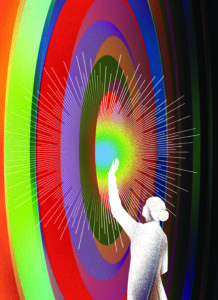Grammy’s rash
A medical student navigates a role reversal, with the help of storytelling

This past fall, I took a break from my studies in medical school at Stanford to visit my grandparents and pick up my haul of vegetables from their garden. Grammy didn’t rise to greet me like usual. At my prompting, she said she had a terrible heat rash along her underwear line, but I wasn’t to worry, she was fine.
I could feel my training kicking in. “Can you describe your rash for me?” I started gathering a history of the present illness. Onset — three days ago. Palliation — Gold Bond applied 2x daily (I made a mental note: Figure out what “Gold Bond” is). Quality — burning. Patient’s perspective — “fine, really.”

“Do you want to look at it?” she asked. We were in the kitchen.
I suggested moving to the bathroom, and when Grammy tugged down part of her underwear she revealed an ugly red rash and some crusty white powder. The Gold Bond. “It’s looking better today,” she said apologetically.
I stalled. “I haven’t done my dermatology block yet” (as if that would help), “but I’d take off your underwear for a few days and try hydrocortisone cream on a small portion to see if that area gets better.”
When I called the next day, Grammy sounded more like herself. I called a week later and Grammy was effusive. “The rash is gone. I don’t know what I would have done without you. You’re my doctor now.”
I sidestepped her thanks uncomfortably. “How did the hydrocortisone trial go?”
“I’ve been putting it all over the rash,” she said blithely. I resisted the urge to tell her that my instructions had been to try it on only part of the rash. I asked if she’d found different underwear.
She was suddenly defensive. “I haven’t worn underwear since you told me to stop wearing it. I’ve been doing everything you told me to do.”
I was shocked at her willingness to trust me.
I recounted this tale at the storytelling retreat I co-led this fall with Laurel Braitman, writer-in-residence at Stanford’s Medicine and the Muse program. We gathered at a farm in Vacaville with writers, physicians and 25 medical students to explore how storytelling can influence the learning and practice of medicine.
After hearing my story, my peers described their own role reversals with family members, fears of causing unintended harm, and surprise at how seriously their medical advice is taken. The physicians told us that, to some extent, these feelings never go away. Even the most experienced described being surprised by moments of intimacy with patients.
Rebecca Skloot, author of The Immortal Life of Henrietta Lacks, joined us on the retreat. She advised us to keep a journal while we’re in medical school. Remember how quickly patients have to trust their health care team with their bodies and their stories, she told us. Don’t underestimate how much you’ll learn about people when you take care of their bodies.
While I treated her rash, I saw a side of my Grammy I’d never seen before and, as I’ve told her story, I’ve learned things about myself I’d never known before. While not every patient interaction may have as large an impact on my journey to becoming a physician, I’ll take the advice to keep writing them down. You never know what can you learn when treating a rash.

